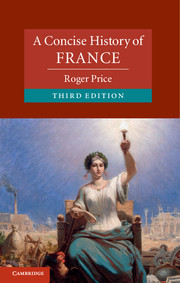Book contents
- Frontmatter
- Contents
- List of Plates
- List of Figures
- List of Tables
- Acknowledgements
- Introduction
- Part I Medieval and Early Modern France
- Part II The Dual Revolution: Modern and Contemporary France
- 4 Revolution and Empire
- 5 The nineteenth century
- 6 A time of crisis
- 7 Reconstruction and renewal
- 8 A society under stress
- A short guide to further reading
- Index
4 - Revolution and Empire
Published online by Cambridge University Press: 05 June 2014
- Frontmatter
- Contents
- List of Plates
- List of Figures
- List of Tables
- Acknowledgements
- Introduction
- Part I Medieval and Early Modern France
- Part II The Dual Revolution: Modern and Contemporary France
- 4 Revolution and Empire
- 5 The nineteenth century
- 6 A time of crisis
- 7 Reconstruction and renewal
- 8 A society under stress
- A short guide to further reading
- Index
Summary
The final crisis of the ancien régime
The collapse of absolute monarchy was to be sudden and shocking to contemporaries. It heralded two decades of revolutionary turbulence and war, of unprecedented change, after a century or more free from serious internal disorder. Moreover, the stability of the social and state systems of most European countries were to be threatened and a new political culture established that still shapes our thought and action. Inevitably, explanations of these events have varied. The concept of the bourgeois revolution, invented by liberal historians such as François Mignet and François Guizot in the 1820s, and refined by Karl Marx, enjoyed a final flourish on the 150th anniversary of the Revolution in 1939 with the appearance of Georges Lefebvre’s Quatre-Vingt-Neuf (subsequently translated as The Coming of the French Revolution). For its author, the Revolution represented the seizure of power by the bourgeoisie, a class created by the centuries-long development of capitalism in French society. That the representatives of this class were able to seize power, destroy aristocratic privilege and establish civic equality was due to the collapse of monarchical power. This had occurred because of the unwillingness of the landed aristocracy to contemplate fiscal and institutional reforms, which would have reduced their privileges, and the ability of bourgeois political leaders to take advantage of mass discontent in the countryside and amongst the urban poor, particularly in Paris, in order to defeat aristocratic and monarchical reaction. Lefebvre in effect identified four revolutionary movements: that of the aristocracy – which prevented monarchical reform; that of the bourgeoisie; the urban revolution, symbolised by the storming of the Bastille; and the peasant revolution. They were interlinked, but each had its own distinctive objectives.
- Type
- Chapter
- Information
- A Concise History of France , pp. 99 - 164Publisher: Cambridge University PressPrint publication year: 2014



